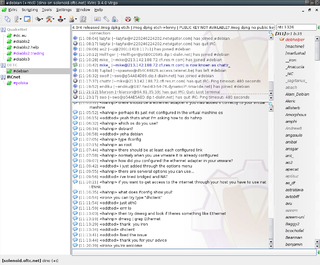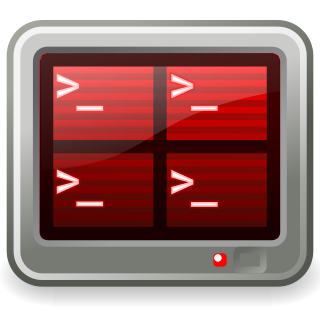
Irssi is an Internet Relay Chat (IRC) client program for Linux, FreeBSD, macOS and Microsoft Windows. It was originally written by Timo Sirainen, and released under the terms of the GNU GPL-2.0-or-later in January 1999.

A Linux distribution is an operating system made from a software collection that includes the Linux kernel and often a package management system. Linux users usually obtain their operating system by downloading one of the Linux distributions, which are available for a wide variety of systems ranging from embedded devices and personal computers to powerful supercomputers.
phpLDAPadmin is a web app for administering Lightweight Directory Access Protocol (LDAP) servers. It's written in the PHP programming language, and is licensed under the GNU General Public License. The application is available in 14 languages and supports UTF-8 encoded directory strings.
Technical variations of Linux distributions include support for different hardware devices and systems or software package configurations. Organizational differences may be motivated by historical reasons. Other criteria include security, including how quickly security upgrades are available; ease of package management; and number of packages available.
Squashfs is a compressed read-only file system for Linux. Squashfs compresses files, inodes and directories, and supports block sizes from 4 KiB up to 1 MiB for greater compression. Several compression algorithms are supported. Squashfs is also the name of free software, licensed under the GPL, for accessing Squashfs filesystems.

PulseAudio is a network-capable sound server program distributed via the freedesktop.org project. It runs mainly on Linux, including Windows Subsystem for Linux on Microsoft Windows and Termux on Android; various BSD distributions such as FreeBSD, OpenBSD, and macOS; as well as Illumos distributions and the Solaris operating system. It serves as a middleware in between applications and hardware and handles raw PCM audio streams.

Smuxi is a cross-platform IRC client for the GNOME desktop inspired by Irssi. It pioneered the concept of separating the frontend client from the backend engine which manages connections to IRC servers inside a single graphical application.

Linux-libre is a modified version of the Linux kernel that contains no binary blobs, obfuscated code, or code released under proprietary licenses. In the Linux kernel, they are mostly used for proprietary firmware images. While generally redistributable, binary blobs do not give the user the freedom to audit, modify, or, consequently, redistribute their modified versions. The GNU Project keeps Linux-libre in synchronization with the mainline Linux kernel.

awesome is a dynamic window manager for the X Window System developed in the C and Lua programming languages. Lua is also used for configuring and extending the window manager. Its development began as a fork of dwm. It aims to be extremely small and fast, yet extensively customizable. It makes it possible for the user to manage windows with the use of keyboard.

KVIrc is a graphical IRC client for Linux, Unix, Mac OS and Windows. The name is an acronym of K Visual IRC in which the K stands for a dependency to KDE, which became optional from version 2.0.0. The software is based on the Qt framework and its code is released under a modified GNU General Public License.

Leafpad is a free and open-source graphical text editor for Linux, Berkeley Software Distribution (BSD), and Maemo that is similar to the Microsoft Windows program Notepad. Created with the focus of being a lightweight text editor with minimal dependencies, it is designed to be simple-to-use and easy-to-compile.

Zim is a graphical text editor designed to maintain a collection of locally stored wiki-pages, a personal wiki. Each wiki-page can contain things like text with simple formatting, links to other pages, attachments, and images. Additional plugins, such as an equation editor and spell-checker, are also available. The wiki-pages are stored in a folder structure in plain text files with wiki formatting. Zim can be used with the Getting Things Done method.
Dracut is a set of tools that provide enhanced functionality for automating the Linux boot process. The tool named dracut is used to create a Linux boot image (initramfs) by copying tools and files from an installed system and combining it with the Dracut framework, which is usually found in /usr/lib/dracut/modules.d.

Zathura is a free, plugin-based document viewer. Plugins are available for PDF, PostScript and DjVu. It was written to be lightweight and controlled with vi-like keybindings. Zathura's customizability makes it well-liked by many Linux users.

Advanced Simulation Library (ASL) is free and open-source hardware-accelerated multiphysics simulation platform. It enables users to write customized numerical solvers in C++ and deploy them on a variety of massively parallel architectures, ranging from inexpensive FPGAs, DSPs and GPUs up to heterogeneous clusters and supercomputers. Its internal computational engine is written in OpenCL and utilizes matrix-free solution techniques. ASL implements variety of modern numerical methods, i.a. level-set method, lattice Boltzmann, immersed Boundary. Mesh-free, immersed boundary approach allows users to move from CAD directly to simulation, reducing pre-processing efforts and number of potential errors. ASL can be used to model various coupled physical and chemical phenomena, especially in the field of computational fluid dynamics. It is distributed under the free GNU Affero General Public License with an optional commercial license.

GNOME SoundConverter is an unofficial GNOME-based free and open-source transcoder for digital audio files. It uses GStreamer for input and output files. It has multi threaded design and can also extract the audio from video files.

Lector is a free e-book reading application for desktop Linux systems that also has basic collection management features.

GNOME Terminator is a free and open-source terminal emulator for Linux programmed in Python, licensed under GPL-2.0-only. The goal of the project is to produce a useful tool for arranging terminals. It is inspired by programs such as gnome-multi-term, QuadKonsole, etc. In that the main focus is arranging terminals in grids. Terminator packages exist for Arch, Debian/Ubuntu, Fedora, OpenSUSE, Gentoo, Snap, FreeBSD, OpenBSD. In 2017 took second place in voting at opensource.com, after Gnome Terminal.












